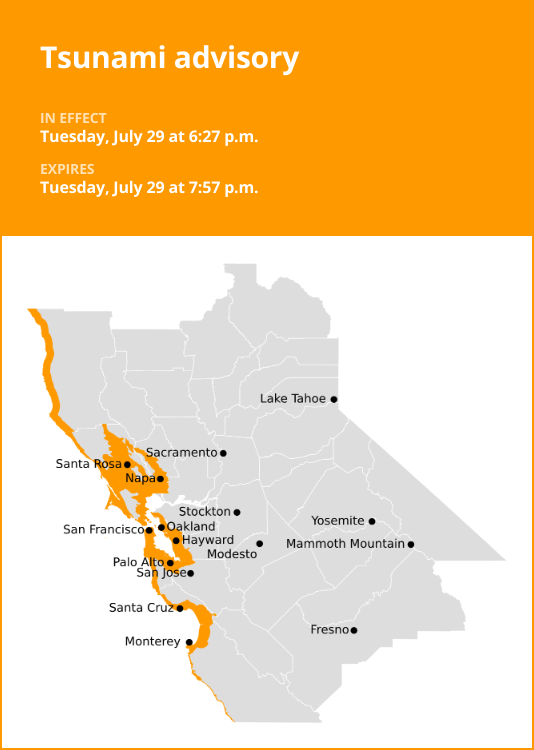Bay Area Shorelines was placed under a tsunami advisory by the National Weather Service on Tuesday at 6:27 p.m. The advisory is in effect until 7:57 p.m.
“If you are located in this coastal area, move off the beach and out of harbors and marinas. Tsunami advisories mean that a tsunami capable of producing strong currents or waves dangerous to persons in or very near the water is expected or is already occurring. Areas in the advisory should not expect widespread inundation. Tsunamis are a series of waves dangerous many hours after initial arrival time. The first wave may not be the largest. At 4:25 p.m. Pacific Daylight Time on July 29 an earthquake with preliminary magnitude 8.7 occurred 80 miles southeast of Petropavlovsk Kamchatka. Estimated tsunami start times for selected sites are; Langara British Columbia 10:05 p.m. PDT. July 29. Tofino British Columbia 11:30 p.m. PDT. July 29. La Push Washington 11:35 p.m. PDT. July 29. Neah Bay Washington 11:40 p.m. PDT. July 29. Port Orford Oregon 11:40 p.m. PDT. July 29. Long Beach Washington 11:45 p.m. PDT. July 29. Charleston Oregon 11:45 p.m. PDT. July 29. Brookings Oregon 11:50 p.m. PDT. July 29. Fort Bragg California 11:50 p.m. PDT. July 29. Moclips Washington 11:50 p.m. PDT. July 29. Westport Washington 11:55 p.m. PDT. July 29. Seaside Oregon 11:55 p.m. PDT. July 29. Newport Oregon 11:55 p.m. PDT. July 29. Crescent City California 11:55 p.m. PDT. July 29. Monterey California 12:15 a.m. PDT. July 30. Port Angeles Washington 12:20 a.m. PDT. July 30. Port San Luis California 12:35 a.m. PDT. July 30. San Francisco California 12:40 a.m. PDT. July 30. Port Townsend Washington 12:45 a.m. PDT. July 30. Santa Barbara California 12:50 a.m. PDT. July 30. Los Angeles Harbor California 1:05 a.m. PDT. July 30. Newport Beach California 1:10 a.m. PDT. July 30. Bellingham Washington 1:10 a.m. PDT. July 30. Oceanside California 1:15 a.m. PDT. July 30. La Jolla California 1:15 a.m. PDT. July 30. Tacoma Washington 2 a.m. PDT. July 30,” says the NWS National Tsunami Warning Center.
The full list of affected locations includes:
- Northern Monterey Bay
- Coastal North Bay including Point Reyes National Seashore
- North Bay Interior Valleys
- San Francisco Bay Shoreline
- San Francisco Peninsula Coast
- San Pablo Bay, Suisun Bay, the West Delta and the San Francisco Bay north of the Bay Bridge
- San Francisco Bay South of the Bay Bridge
- San Diego County Coastal Areas
- Ventura County Beaches
- Malibu Coast
- Los Angeles County Beaches
- Palos Verdes Hills
- Orange County Coastal
- Catalina and Santa Barbara Islands
- San Miguel and Santa Rosa Islands
- Santa Cruz and Anacapa Islands
- Santa Barbara County Southwestern Coast
- Santa Barbara County Southeastern Coast
- San Luis Obispo County Beaches
- San Luis Obispo County Inland Central Coast
- Santa Lucia Mountains
- Santa Barbara County Central Coast Beaches
- Southern Monterey Bay and Big Sur Coast
- Mendocino Coast
- Southwestern Humboldt
- Northern Humboldt Coast
- Coastal Del Norte
- South Central Oregon Coast
- Curry County Coast
- Central Coast of Oregon
- Clatsop County Coast
- Tillamook County Coast
- South Washington Coast
- Lowlands of Western Whatcom County
- Lowlands of Western Skagit and Northwestern Snohomish counties
- Port Townsend area
- Eastern Strait of Juan de Fuca
- Western Strait of Juan de Fuca
- Northern Washington Coast
- Grays Harbor County Coast
- Lower Chehalis River Valley
- San Francisco County
- San Juan County
- Island County

Tsunami alerts: What each level signifies
When it comes to tsunami alerts, knowledge is your best defense. The NWS categorizes tsunami alerts into four levels, each signifying a different degree of risk:
Tsunami warning: Immediate action required
A tsunami that may cause widespread flooding is expected or occurring. Dangerous coastal flooding and powerful currents are possible and may continue for several hours or days after initial arrival. Follow instructions from local officials. Evacuation is recommended. Move to high ground or inland (away from the water).
Tsunami advisory: Exercise caution
When a tsunami with strong currents or hazardous waves near the water’s edge is expected or occurring, a tsunami advisory is issued. Flooding in beach and harbor areas may occur. Stay out of the water and follow instructions from local authorities.
Tsunami watch: Be prepared
A tsunami watch is initiated when a distant earthquake occurs, raising the possibility of a tsunami. People in affected areas should stay tuned for updates and be prepared to take action if necessary, even though the threat isn’t immediate.
Tsunami information statement: No immediate threat
This statement is issued when an earthquake has taken place, but there is either no threat or it was so distant that it poses no danger. In most cases, there is no potential for a destructive tsunami.
It’s important to note that official warnings may not always provide sufficient lead time in the event of a tsunami. Natural signs can serve as early warnings. If you’re near the coast and experience a powerful or prolonged earthquake, witness a sudden rise or fall of the ocean, or hear a loud roar from the sea, these are nature’s cues. Don’t wait for official instructions; take immediate action to move to a safe location. Your safety is paramount, and understanding these alerts can make a life-saving difference.